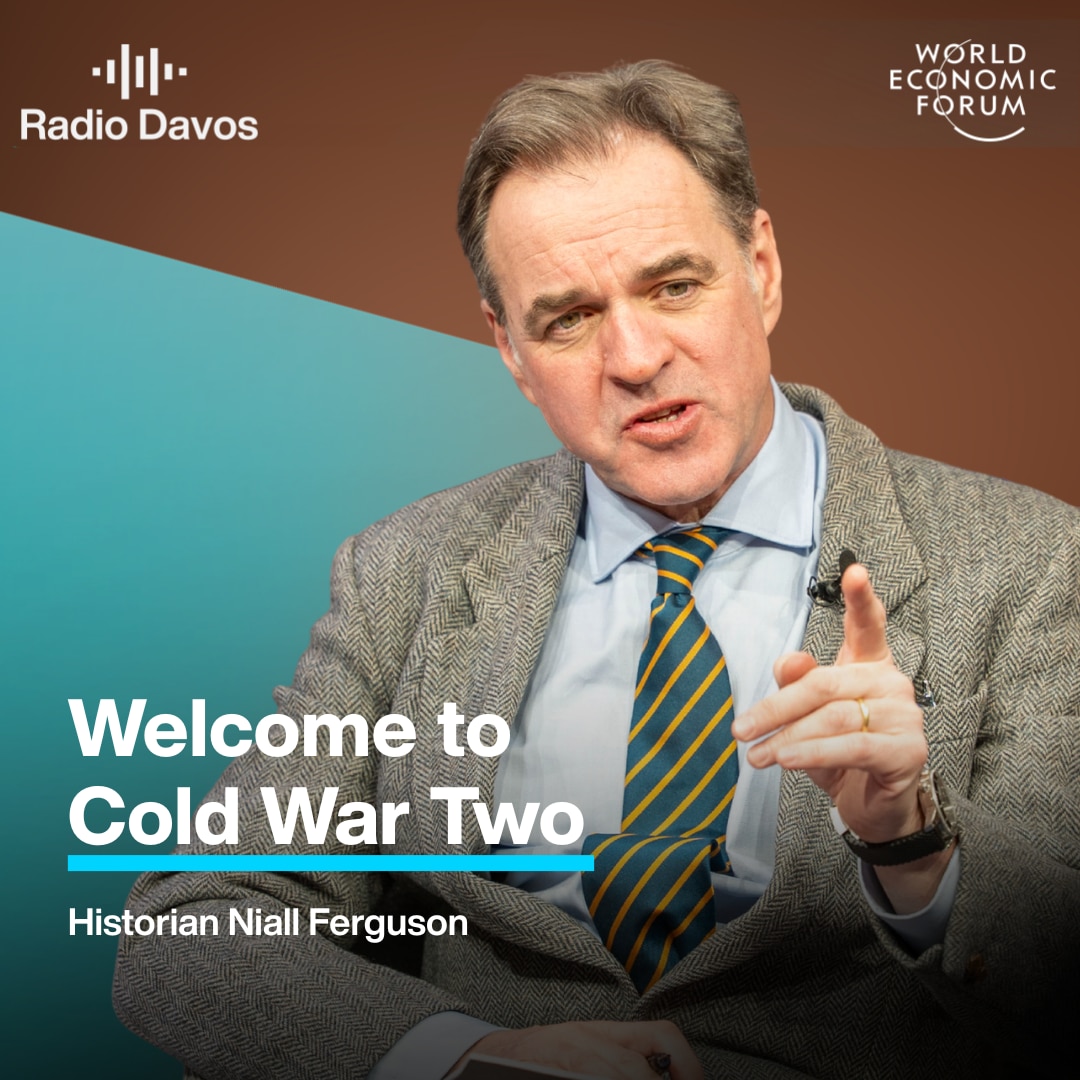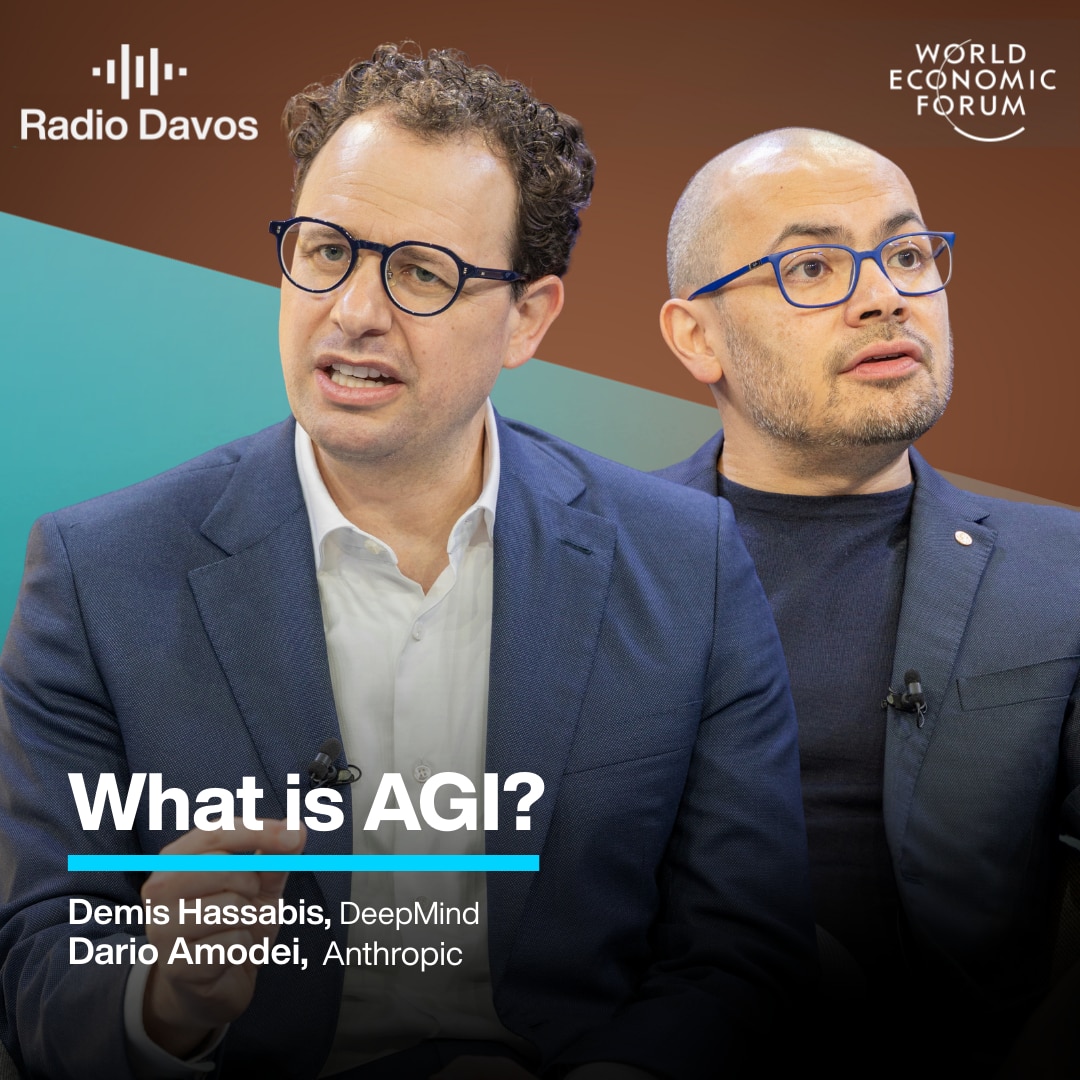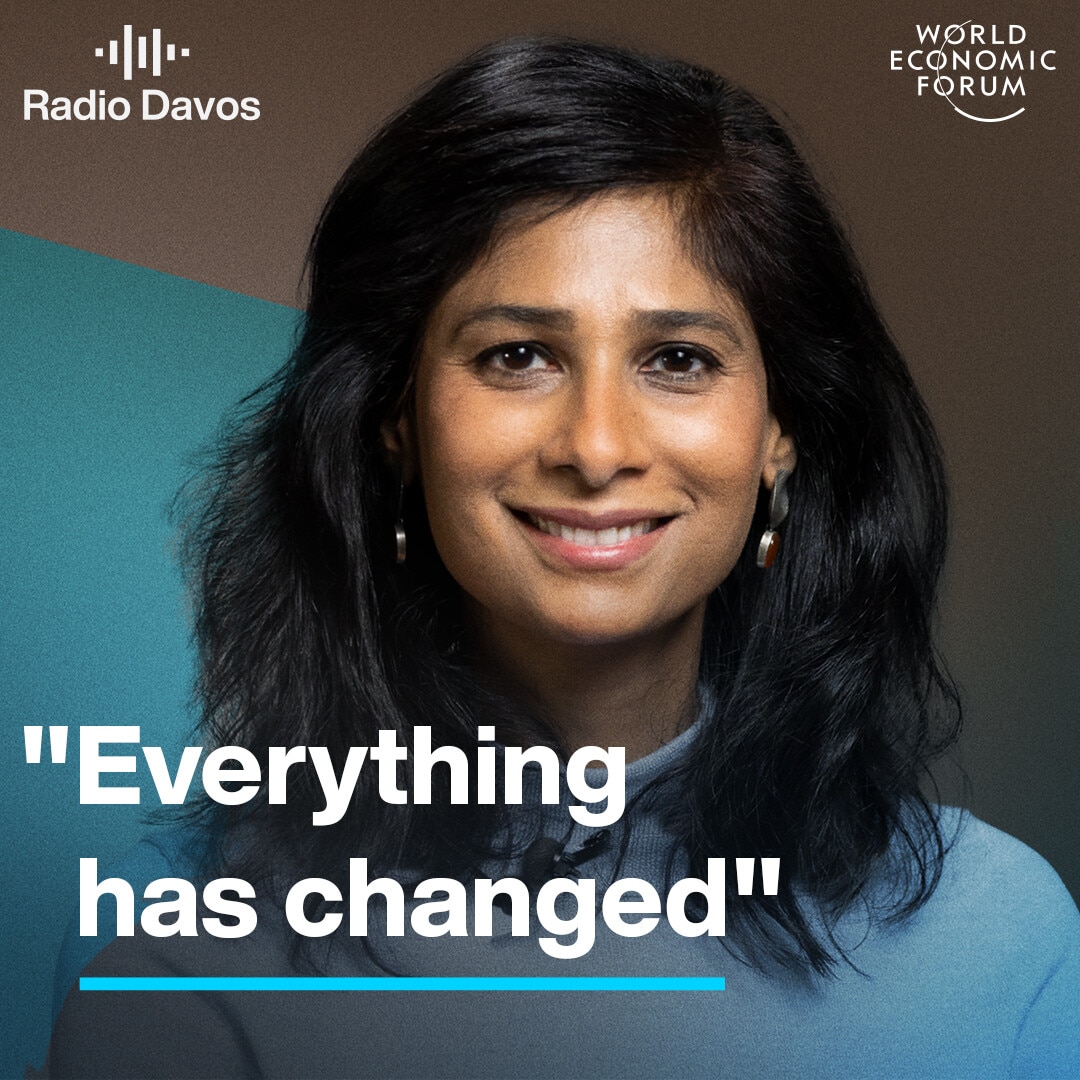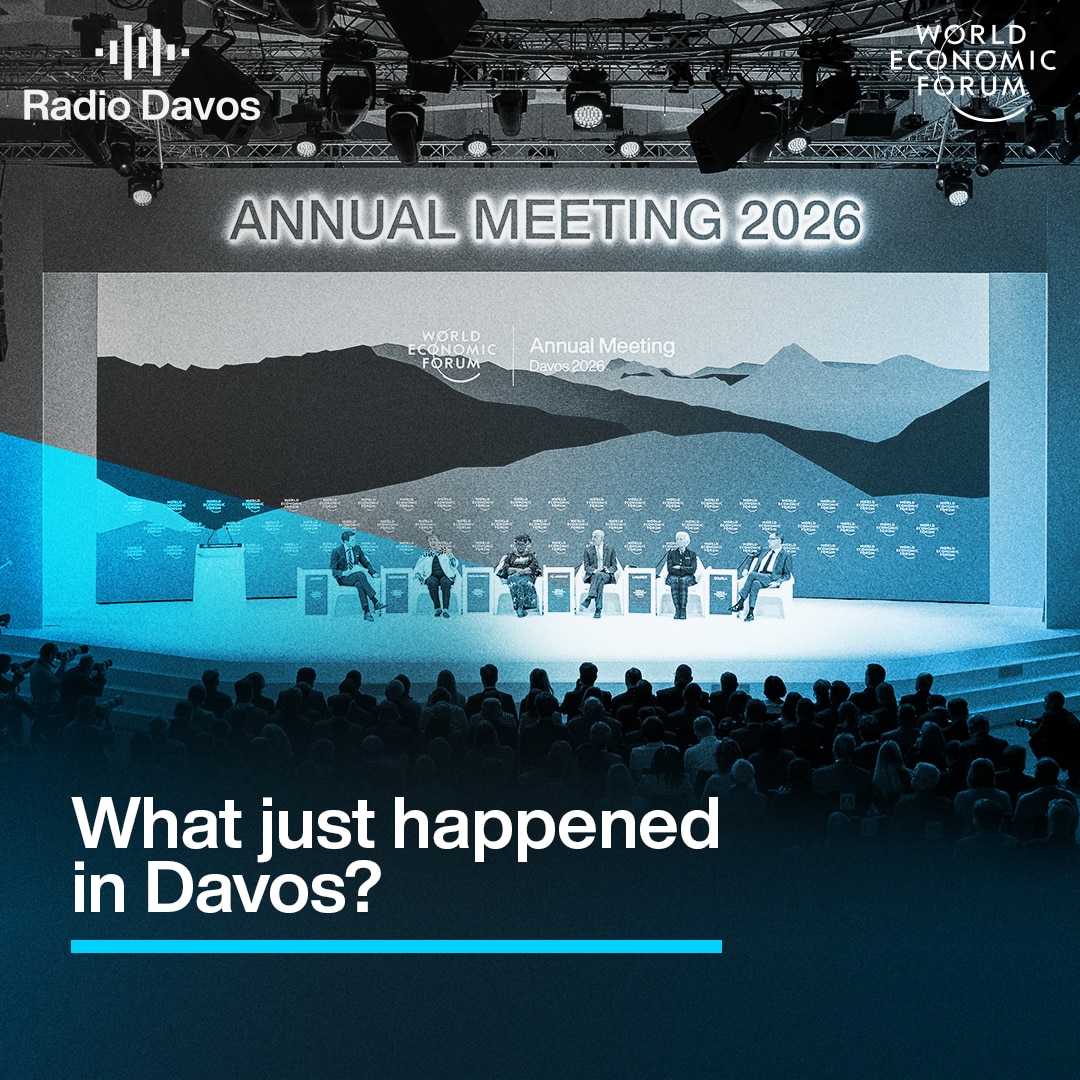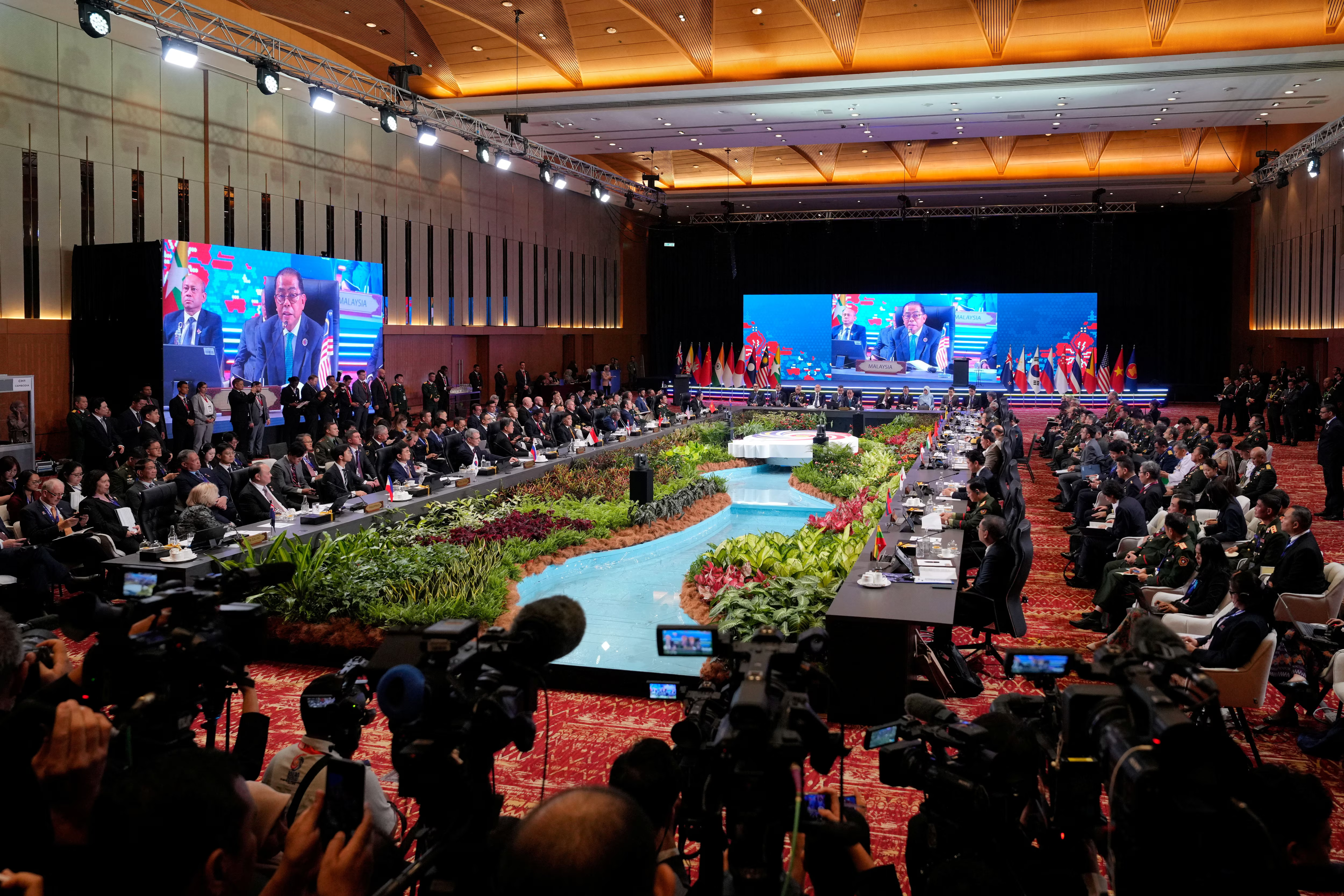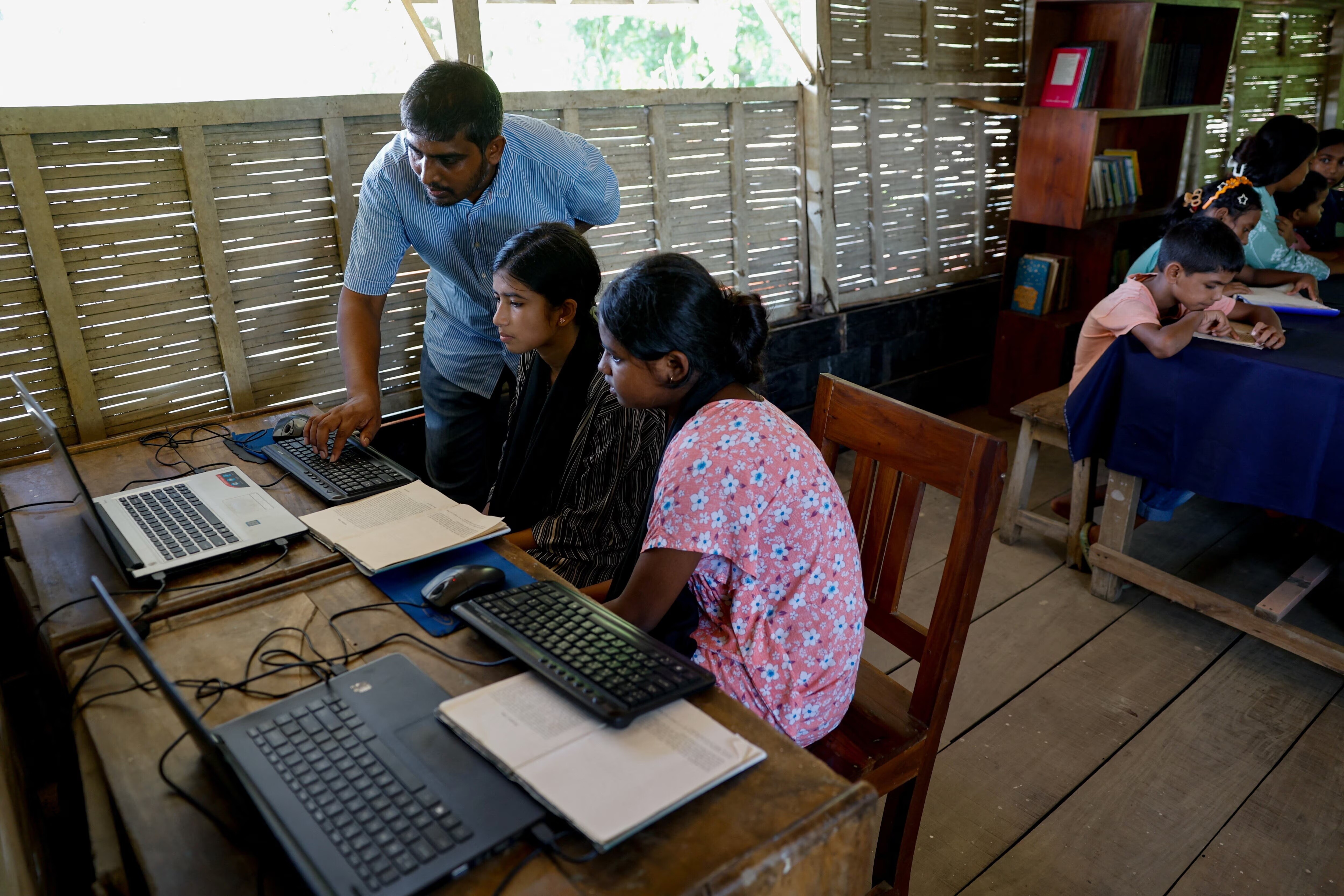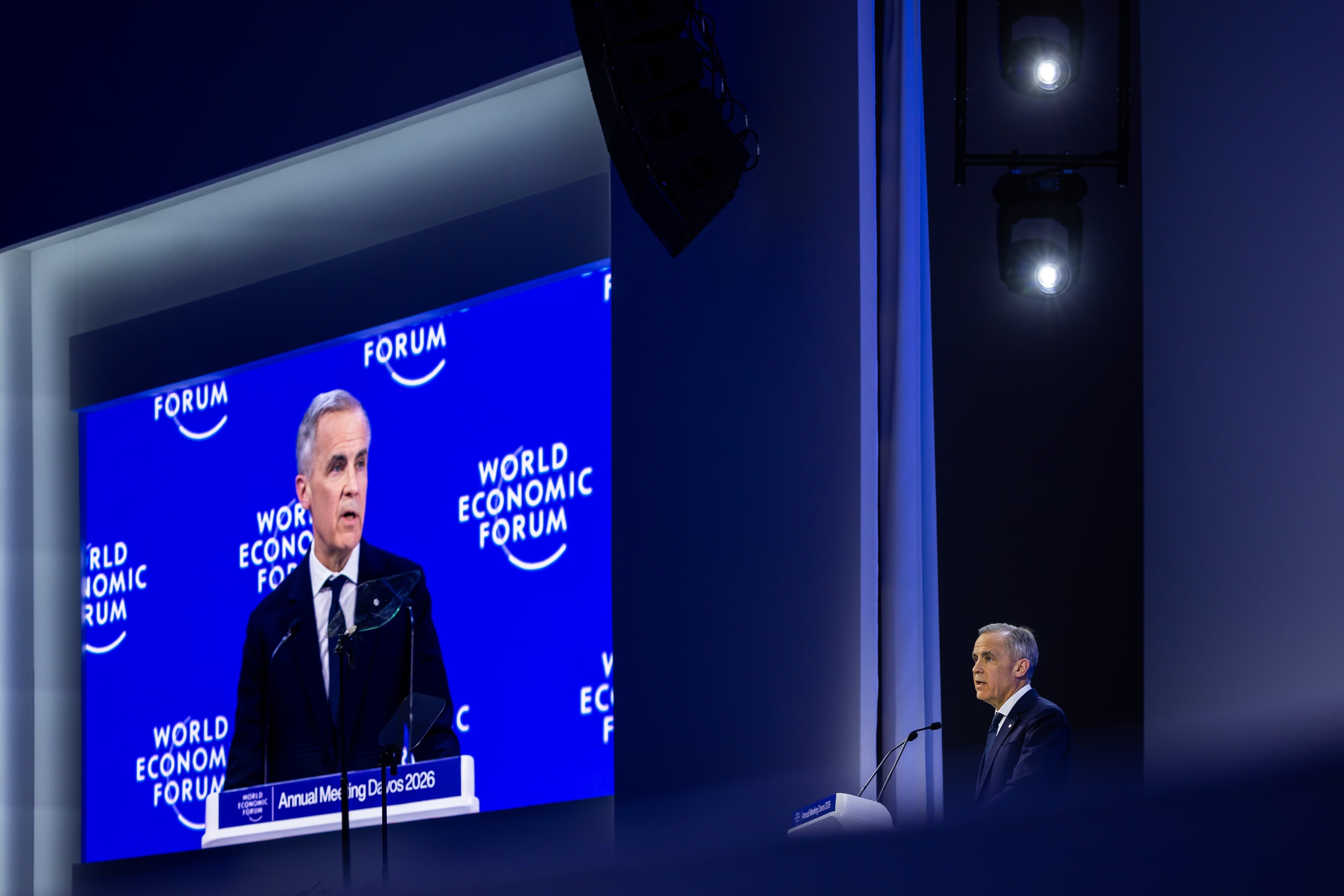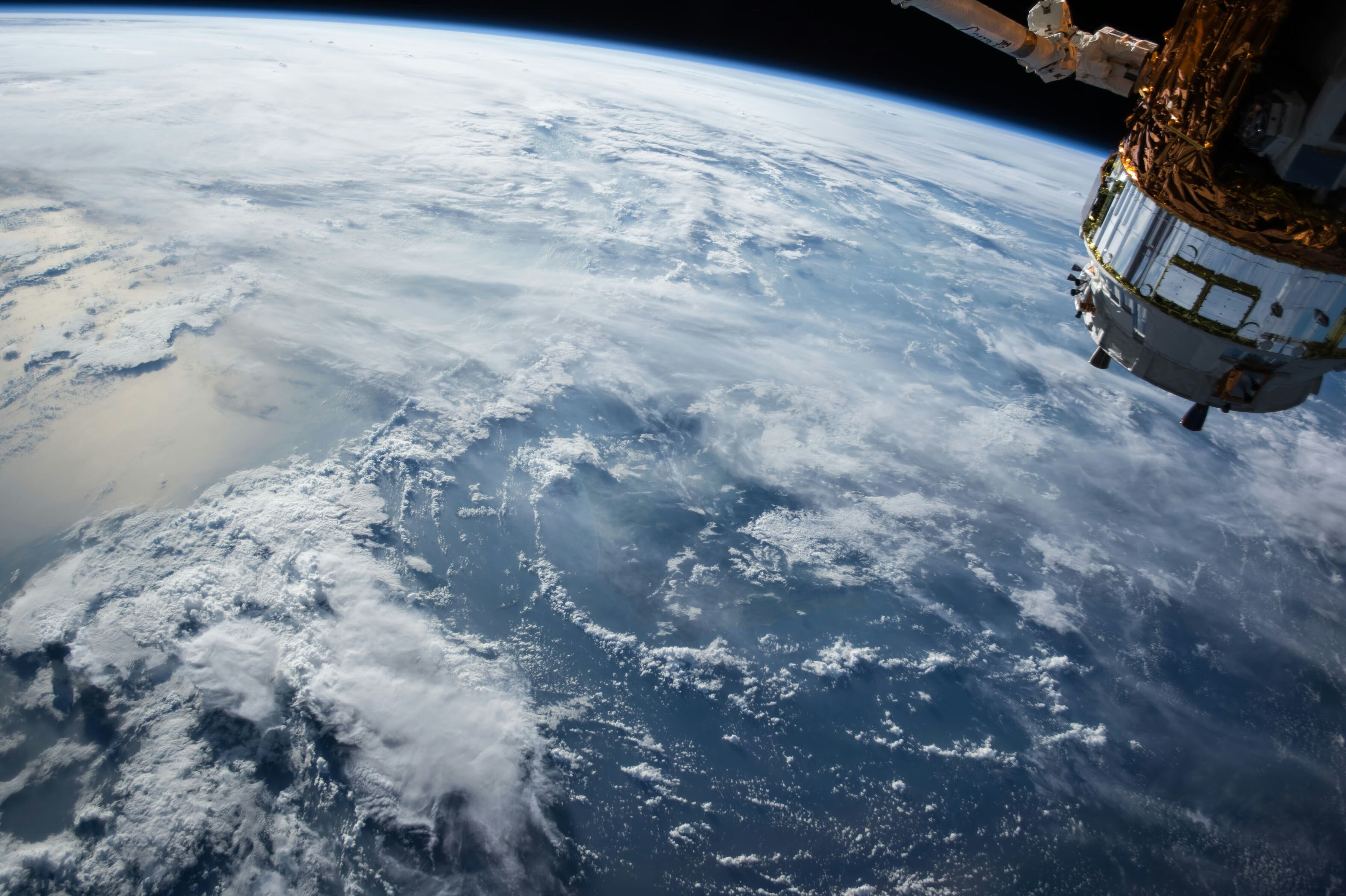Can climate action survive geopolitical upheaval?
Transcripción del podcast
Arun Sharma, senior advisor to the Chairman, Adani Group: Yes, it is important to be aware of the geopolitical tension between US and China, but the world just doesn't revolve around just that tension. Players like India, by simply their sheer scale, are going to become a global player in this space.
Robin Pomeroy, host, World Economic Forum: Welcome to Radio Davos, the podcast from the World Economic Forum that looks at the biggest challenges and how we might solve them. This week what impact does geopolitics have on humanity’s ability to tackle climate change? We hear from two experts.
Varun Sivaram, Senior Fellow for Energy and Climate, Council on Foreign Relations: While all eyes are on issues that are not climate, whether it's the Ukraine war, the Israel-Gaza conflict, trade tensions, security conflicts, etc., the attention on climate withers and as a result we don't make very much progress
Robin Pomeroy: In a year when elections are changing the colour of governments around the world, these experts say the economic case for decarbonisation can succeed even when the political will is lacking - and will help close the global North-South divide
Varun Sivaram: Around the world, as these technology costs fall, we will actually have done more to reduce global climate change by bringing down the cost of technology than we would have by trying to mobilise some paltry amount of international aid funding.
Robin Pomeroy: Find Radio Davos wherever you get your podcasts and at wef.ch/podcasts where you will also find our sister programmes, Meet the Leader and Agenda Dialogues.
I’m Robin Pomeroy at the World Economic Forum, and with this look at geopolitics and climate change...
Varun Sivaram: We need to be done with this North-South divide, this emerging economy, developed country divide. We all need to get to zero. We need to do it now.
Robin Pomeroy: This is Radio Davos.
Welcome to Radio Davos, the podcast from the World Economic Forum that looks at the biggest challenges and how we might solve them. This week we're looking at geopolitics and climate change, and I'm joined by a co-host, my colleague Jess Margolis. Hi, Jess. How are you?
Jessica Margolis, Lead, Geopolitical Agenda, World Economic Forum: I'm good. How are you doing?
Robin Pomeroy: I'm very well thanks, Jess. Now, Jess, you manage the World Economic Forum's Global Future Council on Geopolitics. Remind us what that is.
Jessica Margolis: The Global Future Councils are multi-stakeholder fora at the forum, and I manage the Global Future Council on Geopolitics, as you said, which is a collection of 20 individuals from civil society, academia, the private sector, the public sector, who all have expertise on geopolitics. And this January, they published a report called Shaping Cooperation in a Fragmenting World, which looks at ways to increase cooperation despite the current turbulent geopolitical landscape that we're in, across four themes: trade, technology, security and climate. And the climate chapter has inspired this conversation.
Robin Pomeroy: Right. And regular listeners to Radio Davos will have heard the Global Future Council on Geopolitics a couple of months ago, we did an episode about the role of the so-called middle powers. That went so well, a discussion we had, we're revisiting the format this time, particularly this time to look at climate change, and as you said, the fragmentation of geopolitics or geopolitical strains or conflicts. And just as in that previous episode of Radio Davos, we have two experts joining us down the line, and you're going to introduce us to them.
Jessica Margolis: Yes. So first we're joined by Doctor Varun Sivaram, who is the senior fellow for energy and climate at the Council on Foreign Relations. Varun previously served as chief strategy and innovation officer at Orsted, which is the world's largest producer of offshore wind energy, and he was a senior advisor to Secretary John Kerry when he was U.S. special presidential envoy for climate during the Biden administration.
We're also joined by Doctor Arun Sharma, who is senior advisor to the chairman of Adani Group, one of India's largest multinational conglomerates. And Arun leads the group's sustainability function and is also a distinguished professor emeritus at Queensland University of Technology. So welcome everyone.
Robin Pomeroy: It's great to meet you both. So today we'll be talking about geopolitics, the relationship to climate change. And let's start with the governance of climate change. Most people will have heard of the climate COPs, the conferences of the parties, the signatories to the UN Climate Change Convention, that happen every year. And they are supposed to set the global approach to climate mitigation. I wonder how the current situation of geopolitics is impacting on that process. Who wants to start us off? Varun.
Varun Sivaram: Sure, thanks, Robin and Jess, and thanks for having me on. Look, it's a great question.
You might think, look, with the fragmentation, we're seeing geopolitical tensions. If, in fact, climate progress were driven through the COPs, we should be very worried. The good news, however, and this is a controversial point, the good news is that climate progress actually probably isn't driven primarily through the COPs. The COPs, as you mentioned, Robin, are these United Nations convening, these jamborees every year where countries around the world get together. They can hardly agree on anything. And that's probably the reason why very little actually gets done in these COPs.
The high watermark of the COPs was probably the 2015 Paris summit when Secretary John Kerry, who I'd then go on to work for, negotiated the Paris Agreement, in which countries basically said, look, we will sign up to do what we think we can do, no more. And the collective pledges we're going to make are not actually going to be enough to stop climate change or to limit it to 1.5 or 2 degrees warming.
Well, after Paris, we had this intense pressure campaign when President Biden became president of the US in 2021, and when Secretary Kerry became the envoy, we got countries around the world to make new and ambitious pledges. And largely this worked in the developed world. In the developed world, for example, our G7 partners, nearly everybody made net zero by 2050 pledges. These targets are sufficient for the world to keep to a 1.5 or 2 degrees global warming target.
The problem with the developing world, emerging economies, did not make similar equivalent pledges. And so we've kind of hit a wall in terms of progress you can make through a grand UN negotiation process.
The good news, however, is despite the fragmentation impact on COP climate governance, which is, you know, the COPs are messier than ever, a lot of good progress is still happening in the private sector, in the energy transition and through domestic policy.
Look, last year solar deployment was up 70%. If you count this year, we're going to be up 100% over 2022, more than 500GW, half a terawatt, installed. The clean energy transition continues. I've worked for, you know, the biggest wind energy company, one of India's largest, clean energy companies. I've seen it on the ground. And so long as this continues and technologies improve, it doesn't actually matter very much whether the COPs get anything done. What's critical is that competition continues to drive a race to the top on the clean energy transition.
Now there are problems there ahead. We should talk about them. But I just want to refocus us away from the governance, which is largely a red herring in my opinion.
Robin Pomeroy: A red herring. Goodness. That's, damning with, not even faint praise, I don't think. Arun, would you agree with that? It seems the argument there is the profit motive and the kind of private sector just has an interest in cracking on, competing on a global scale for these green technologies. And actually, the diplomatic situation is less important.
Arun Sharma: I think we're going to need multiple approaches if we are going to face this challenge of getting to net zero in time enough so that we do not have significant adverse impact on global warming.
COPs will have a role to play, and I'll come to that, where they have a role to play.
Yes, the private sector investment is going to be critical. And private sector investment will be required in the developing world, as Varun says, is not keeping pace.
But we have to look at it from the perspective of the developing world. And yes, I know that they were not responsible for the historical accumulation of emissions. They also live in a world where climate change is a reality, and much of the the adverse impact will be felt in the global South. So it's not that they don't understand this.
But what we need is the energy transition. India has set a target of 500 gigawatt of non-fossil fuel based electric generation capacity by 2030. Our own, my own group, Adani Group, is on track to deliver 50 gigawatt of that by 2030. We are the largest renewable energy company in India and one of the largest in the world today.
So the private sector is working, but the challenge is that the cost of capital in the global South is significantly higher than the global North, and we might touch upon this when we look at more practical ways by which we can address this.
But having said this, COP has a role to play. COP has a role to play because it can look at the differentiated trajectory of different parts of the world in meeting the climate change. It has to develop the framework by which the developed economies are assisting the global South. Because without that, a support across the planet is not going to happen.
So while I agree with Varun that private sector has to play an important role, without the governance mechanism, a global governance mechanism, of the COP, we are in a sort of uncharted territory.
Jessica Margolis: That's great. Thank you. And I think some of what you said actually segue is now to our to our next topic, which is kind of unpacking this North-South divide. As we know, developed nations are responsible for the vast majority of carbon emissions historically. And some developing nations now feel that they're being asked to solve a climate crisis that maybe they didn't create, and potentially to the detriment of building out their economies.
And on top of that, only about 25% of global climate financing is currently flowing to nations in the global South.
So my question is, what is a fair balance of responsibilities between developed and developing nations when it comes to climate action and in particular, climate financing? So Arun maybe we'll start with you, and then Varun we can we can go over to you.
Arun Sharma: So as I said, that inequitable growth and energy transition, we are not going to see a solution that is widely accepted by the global South.
If you look at a country like India, in terms of energy consumption per capita, it is one tenth of many developed economies like the US. In terms of emissions, it is way down per capita.
India's economy has to grow. It has to grow multiple, multiple fold if its people have to have the quality of life they deserve.
Let me give you a very simple example. For every trillion dollar of GDP, India's emissions are around 780 million tons of carbon dioxide. For China. It is 590 million tons. For the United States. It's 190 million tons. And for the European Union, it's 160 million tons.
Now, if anyone tells India that you are not going to add a few trillion dollars more in this decade, then they are basically asking India to stop growing. That could happen. And what's the best way to decrease the emission intensity of the Indian economy is to help India decarbonise the grid. The Indian government policy of accelerating renewable expansion is the single most important way in which India can decarbonise. And as a result, the whole world can decarbonise.
And again, the subject that needs to be paid attention is how can we make finance available to the Indian private sector at the same rate as it is in the West.
For these projects, India is addressing permitting problems. India is building evacuation capacity. When we started building the largest renewable part at Khavda, and the first two and half gigawatt of the 30 gigawatt are already operational. The transmission line capability connecting to the national grid was ready before a single electron was fired. What else does the West need to understand that there is a sovereign risk involved in providing funding at the same rate as they are doing?
Of course, multilateral development banks can provide some security. But if you are looking at this problem, this is what you have to address. The most important vector that is going to get us to where we want to be.
Robin Pomeroy: What's the solution to that problem? What needs to be done to ensure that the Global South can access that capital in an affordable way?
Arun Sharma: And I think some of the discussion that has been going on is that can the multilateral development banks provide that risk differential.
So rather than funding projects and if they tried funding private sector projects, it will be sort of like, you know, is it the right use of multilateral development funds? But if they bridged the differential between the cost of capital in the global South and the developed economies, then that same sort of investment multiplies multiple fold in doing, in sort of having the the investment that is required. That's just one possible way to look at it.
Robin Pomeroy: Varun, you are going to come in?
Varun Sivaram: Yeah. I've got lots of thoughts here. Let's start with the way Jess framed the question. Which, by the way, I don't disagree with you, Jess. These are all correct statistics, on, you know, who has historically emitted more emissions and less emissions. And to the point on the amount of investment needed in emerging economies. You're absolutely right. Today we have on the order $400 billion flowing into, broadly climate friendly investments in emerging economies. We need more like 2 trillion a year - a fivefold increase in the amount of investment, needed if we're going to kind of broadly keep the world on track for limiting climate change to two degrees.
But this is where the discussion always seems to go off the rails, which is we just don't come up with very many productive solutions. I actually think Varun's idea is a good one and we should prosecute it. However, it's probably not the only thing to be thinking about.
Look, although it's the case that historically developed countries accounted for far more emissions than developing countries going forward, developing countries are on pace to account for far more. India and China alone are going to account for a majority on current pace and speed of future emissions cumulatively before between now in 2100, the United States will account for less than 10%, possibly less than 5% of future emissions. Those are the emissions that we have to abate.
Here's another data point. You know, a lot of hand-wringing happens over the fact that, look, developing countries can't really change their trajectories without, basically, donations from the West. The fallacy in this argument is precisely the example that Varun brought up, which is India. Look, I was, again chief technology officer of ReNew Power and got to see this firsthand in the Indian market. India actually did better than almost every other emerging economy because of domestic policy changes that it made. India actually did not subsidise its solar and wind sectors a great deal between the boom years of 2018 and 2022. In fact, India did a great job of doing this on the cheap. India had actually excellent policy reforms and became one of the world's top three solar markets. India has done better than all the other emerging economies - Indonesia, South Africa, you name a country, India has done better.
It's proof positive, in my opinion, that there are things that emerging economies can do domestically that can really open up access to international capital flows.
I mean, my company, ReNew Power, raised hundreds of millions of dollars in dollar denominated bonds on international financial markets. So the money flows.
Last thing I'd say is, I think this whole concept of Western countries need to donate hundreds of billions of dollars to developing countries is just misconstrued.
I mean, it doesn't work for the domestic political economy of Western countries. You know, voters don't really want to do that.
But moreover, there are more effective things you can do. If you're in the West, for example, and you invest a dollar or 100 million or $1 billion in bringing down the cost of a critical technology that then everybody around the world can use, it's both politically palatable, and it helps even more than just donating that money.
And so therefore, I think that certain aspects of America's Inflation Reduction Act that will reduce the cost of electrolysers and carbon capture, direct air capture, long duration storage and other technologies, yes, we'll do in in the United States with United States technologies. But around the world, as these technology costs fall, we will actually have done more to reduce global climate change by bringing down the cost of technology than we would have by trying to mobilise some paltry amount of international aid funding.
So I'd love to reframe the conversation here in terms of something that's both politically palatable and something that has real impact. I think technology is the key to that.
Robin Pomeroy: That brings us nicely onto the issue of trade and geopolitics. Bcause we've seen in the last few months trade tensions over things like Chinese produced solar panels or electric vehicles, there have been trade tariffs put onto products which in theory should help where I am, Europe, become greener, emit less carbon.
There are various trade tensions which touch on the various green technologies. Is that a problem? And even the I.R.A., the Inflation Reduction Act, in America, worries a lot of other trade blocs. You know, is it anti-competitive? Is it isolationist in some ways? Free trade advocates would say the freer the trade, the lesser the tariffs, the faster we will get those technologies working around the world.
Varun Sivaram: Look, to be clear, Robin, the Inflation Reduction Act does not impose tariffs. It does not obstruct the free flow of goods into the United States. Now it does offer some subsidies that are preferential to American producers or to our allies and partners, people that we have free trade agreements with.
But I want to draw this important distinction between things that basically draw subsidy dollars from generous publics - the United States public is going to be very generous and fund $1.2 trillion to the IRA, and some of that will spill over to global technology costs falling - and policies that increase trade barriers or, put another way, increase the cost of incoming goods. Those policies are actually destructive to the clean energy transition.
And my country has its share of those. The tariff barriers that we've put up, for example, on various products, those do in fact increase the cost of goods, increase the cost of our electric vehicles, for example, the cost of our solar panels.
India, you know, has a policy very recently where basically there's this like licensing list where if you're not a Indian home-grown solar company and you're a Chinese exporter or a Southeast Asian exporter, you're probably not going to get your solar panel imported into India. And every so often, India kind of pauses implementation of this list.
But these are all destructive barriers to the free flow of cheap, clean energy goods.
Now we got to recognise political realities. A country like India or United States wants to make some of this kit at home. They're not satisfied that China gets to dominate the production of solar panels, wind turbines, electric vehicles, batteries. And in fact, China has gone forward and said, look, these are going to be my top strategic industries. I want to build them. I want to make them cheap and I want to export them.
So there is this global competition on who who's going to get to make the products of the future. But Robin, from a pure climate perspective, the answer is clear: policies that raise the costs of incoming goods, such as supply chain components for any of these clean energy products, these policies hinder the ability to deploy clean energy, straightforwardly.
Arun Sharma: So if I can come in here and I think I partly agree with Varun. And I'll take a very simple example.
If you look at solar modules and solar cells, much of the technology was developed in University of New South Wales in Australia and Fraunhofer in Germany, and the scientists from UNSW helped create the Chinese Revolution.
What China did was it invested $160 billion in going ahead of what any country can do in this space, and it was the German feed-in tariffs that created the initial market. And we should not forget that what's happening in the solar technology, which is one of the best approaches to decarbonisation, China played a very significant role.
And India is now trying to build. And we are benefiting from China, the technology that they have developed. Which they took from the West. But they mastered the technology. And they reduced the cost.
And so if a company tells you that geopolitics is stopping them from decarbonising, I don't think it works. But in the long term, these kind of barriers will halt or will slow down the decarbonisation pathway.
Let me give you another example. Varun did mention about electrolysers. Yes, two thirds of the cost of green hydrogen is renewable energy. But the next biggest cost, around 18%, is the cost of electrolysers. And right now we are looking at two different worlds. There are the Chinese electrolyser economics. And then there is the Western electrolyser economics, which is 2 or 3 times more expensive. Okay. And it's not very clear if I.R.A. is going to reduce the cost, because what manufacturers are doing is they're already taking into account the benefits that are going to come from it. And Chinese technology can actually accelerate the adoption of green hydrogen.
And so I think we have to understand that innovation and business development are relay races. We pass the baton from one place to the other, and then someone else passes the baton and it all comes down and we all benefit.
And I think we have to really look at not creating barriers that actually make the transition, like, you know, more difficult. We have to understand what is the purpose? The purpose is decarbonisation and creating a change in the economy that stops the adverse impacts of global warming from happening. The developing countries would actually prefer that it also create jobs because this is a necessity. And so if the developing countries are encouraged to create alternative supply chains, then the whole world benefits.
If India, we are building our solar modules, our wind turbines, and yes, it will be an alternative to China, but we are grateful to China to actually provide the technology which they are grateful to the West for providing the technology.
And this multiple pathways are going to be essential for the developed world to decarbonise faster, because these inputs from multiple supply chains is what is needed as we go ahead.
Varun Sivaram: I couldn't agree more with Arun. I think you put that very well. And I'll just close the loop on that, which is, India has now had this kind of manufacturing renaissance on solar. And one just amazing consequence has been that 99% of India's solar module exports actually come here to the United States.
This works for us on many dimensions. You know, we would like to build our trade ties with India. We also would like to reduce our dependence on China. And finally, we'd love to align our supply chain coalitions on clean energy with our security coalitions on clean energy. And as you know, the Biden administration has spent a lot of effort working with groupings such as the Quad, with India included.
I just want to add one final point, which as Arun mentioned, the ultimate goal here is decarbonisation. Arun believes this. I believe this too. But countries are messy and countries don't have monolithic single goals. The United States has security objectives as well. And so we are right now enmeshed in a, you know, a security competition with China. We have real security considerations. And when it comes, for example, solar really doesn't pose a security risk. So it doesn't actually matter if I'm dependent on China for solar. But it does matter if I'm dependent on something that's a national security commodity. Think batteries is one of those things.
So it does matter, the United States therefore it's going to take action to protect its domestic economy, the military devices that depend on batteries or consumer electronics that depend on batteries and therefore want to diversify our supply chain. So for security reason, we may want to do something that's a little more expensive than the pure best thing for climate, the cheapest way to achieve the climate transition. And that might explain some of the behaviour you're seeing from the US.
Similarly, as Arun mentioned, if you're a developing country, you may care about economic development at home, place based jobs in addition to the cheapest decarbonisation pathway.
Jessica Margolis: Thanks Varun, and if I might just follow up on that, talking about the the geoeconomic competition right now between the U.S. and China, can you discuss a little bit how that might be changing the calculus of other countries, like middle powers, for example, as they think about their climate plans and their climate actions and how it could also be impacting maybe the plans of oil rich nations who, you know, are looking at the energy transition and the move away from fossil fuels and are likely, you know, reconsidering what their plans might be in the future.
Varun Sivaram: Yeah. Let me speculate as to a few different ways this might impact the other countries.
So you think about the United States and China who are going head to head. You know, we announced our tariffs, they announced their export restrictions. The European Union gets involved and announces a 25% tariff on imported electric vehicles.
What happens to the India and Indonesia, etc. of the world? One potential outcome is what I'll call, the dumping ground effect. If China feels like, wow, my exports no longer can enter the United States, and increasingly they can't enter parts of Europe and other parts of the West. I'm going to have excess capacity, and that excess capacity then going to be shunted over to emerging economies.
This can be good for emerging economies in that they get cheap commodities. It can be bad, however, because, you know, as I mentioned, India is making a decision, for example, to start to manufacture solar panels. You can't compete when Chinese solar panels are $0.10 a lot, right? They are simply right now at a very low and depressed price that makes it impossible to build a domestic industry. So that dumping ground effect, I think, is going to affect middle countries.
The second effect, I'd speculate, is there is this global race to dominate supply chains, or at least to secure supply chains, and that means that the countries that have access to the resources are suddenly becoming enmeshed in this tug of war, right? Indonesia, for example, big exporter of nickel, Democratic Republic of Congo for cobalt. Many countries in South America on lithium. You're going to see this tug of war play out between China and the United States.
Look, honestly, it I think in a large way this is good for these third countries. Third countries have some economic leverage. Indonesia, with its new election, you know, is going to now have to decide whether it's going to ban exports or not. I think that would be terrible. Again, trade barriers bad.
And then the third thing to speculate on, I think, is I just don't want to see a lack of focus from the international community, from all these interesting things we're doing. For example, like I mentioned, the Multilateral Development Bank initiatives. I don't want see a lack of focus because the focus being drawn away by this geopolitical conflict, all eyes are on the added states and China. And while all eyes are on that, and while all eyes are on issues that are not climate, whether it's the Ukraine war, the Israel-Gaza conflict, trade tensions, security conflicts, etc., the attention on climate withers and as a result we don't make very much progress on the core decarbonisation objective that Arun mentioned.
So those are kind of three, three, speculative effects of this US-China geopolitical tangle.
Arun Sharma: I sort of tend to agree with Varun.
I think the game is not all about US and China. Where the middle powers can play a role is there are jurisdictions that are committed to the net zero target. So if you look at the European Union and if you start looking at the emissions trading scheme and the rate at which the carbon price is going, and the rate at which it is likely to go for exporters that are prepared to meet the CBAM initiative. And some people say CBAM is actually the trade barrier. And you can debate till cows come home on that one.
Robin Pomeroy: Remind us - CBAM is the EU's...
Arun Sharma: Carbon Border Adjustment Mechanism. That is a mechanism that they have introduced to make sure that emissions are not outsourced to the developing world, but it can also be an opportunity for parts of the developing world where if they can use renewable energy in the manufacturing process, then they can they don't come under the same restrictions, and it creates a opportunity because Europe provides a market because of its emissions trading scheme.
Japan, on the other hand, has an emission trading scheme, but the prices are very low because it is not compulsory yet. But from April of 2026 it becomes a compulsory compliance cap and trade scheme. Now, clearly it will follow a European trajectory.
And so even in the US, like, you know, California has got a cap and trade scheme. So I think, yes, it is important to be aware of the geopolitical tension between. US and China, but the world just doesn't revolve around just that tension because there is innovation happening in the European Union. The Japanese and the South Koreans are looking at it, and and players like India, by simply their sheer scale, are going to become a global player in this space.
So I just want to temper this, the world is coming to an end because of the tension. Now there's a lot happening in the world, a lot good happening in the world.
Robin Pomeroy: Let's move our attention to elections, Jess. You have a question about elections, which seems like everyone's having an election this year.
Jessica Margolis: Sure. Yes. About 49% of the global population has gone to the polls so far or will go to the polls this year. And that's across 64 different countries. Russia, India and the EU, Taiwan have already completed their elections. But of course, there's a lot of speculation and all eyes are watching the U.S. elections this fall. So our question for you is how these elections and new policies that might be emerging from newly elected governments could be changing the climate policy landscape on a global level, and what impact that might also have on the private sector.
Arun Sharma: Can I pick that up?
Jessica Margolis: Please.
Arun Sharma: I think this premise that governments that are right of centre, are conservative, are anti climate, and the governments that are left of centre or communities that are green are totally for climate. I think we have to question that.
Yes. If you look at the United States and Australia at a macro level, right of centre governments probably want the climate transition - they all want climate transition, but not to happen as quickly as enough so that the economies in rural America or rural Australia are able to adjust.
But if you look at the United Kingdom, the conservative governments, right from Margaret Thatcher to Boris Johnson, had been so pro climate that it makes it stand out.
Even if you look at India, and I would say the BJP is right of centre, but it is, and as Varun said, it is the policies of the BJP that have unleashed this solar and wind revolution and now pumped storage that is going to create this transition.
And even in the US. Can I just tell you a very simple fact? If you go to Texas, some of the biggest supporters of wind farm are the ranchers who are getting hundreds of dollars instead of 5 or $6 for cattle or $15 for a deer. And I think there was an article in The Economist a few months back. And they have become the biggest supporters of wind energy. And if you look at some of the biggest challenges that are coming to the scaling up of wind and renewables and the issues with permitting, they are coming from communities that probably are more left of centre.
So I just don't buy that argument. Ultimately, the ranchers of Texas are doing it because it makes economic sense for them. IRA may survive because Republican states are benefiting from it as much, if not more, than Democratic states.
Varun Sivaram: Varun, you are a perceptive observer of US politics. I agree with you on these counts.
You know, when I was working for John Kerry, that's when I feel like some of these politics would matter a lot. I remember a couple elections, the Brazilian election when we moved from Bolsonaro to Lula, the Australian election when we moved to Albanese. And both of those, there was this collective sigh of relief like, oh, we have an ally who likes climate and will talk with us, right? My goodness, you know, we're not going to have the Amazon deforested at the same rate.
I think some of this was genuinely like the leadership change did, in fact, make a big difference to the domestic policy of that country and their international engagement on climate. But I also agree with you that it's not always the case that a leadership change is necessary for the body politic of a country and, frankly, for the economic interests of that country to care about continuing to progress the clean energy transition.
Now, when it does come to my country, the United States, let us not kid ourselves about the stakes here at the election in November. You know, we saw what a Trump presidency looked like the first time. Now, I made the contention that I don't think the COPs matter so much, but it was a big international symbol that President Trump left the Paris Agreement, and he would likely pull the United States out of the entire UN Framework Convention process altogether, which is much more of an irreversible step.
Beyond that, there are United States domestic policies. You mentioned the IRA, but they're also executive policies that we have done at home that could very well be rolled back under a Trump administration.
But the inexorable logic, you mention Arun and I tend to agree with, which is I think there are things in America's interest to continue, to do in climate. First and foremost, frankly, is the competition with China over the industries in the future.
Today, America is the world's largest hydrocarbon producer. It gives us a lot of strength and geopolitical leverage and economic benefit. Well, wouldn't it be bad if in 20 or 30 years, as the world moves to clean energy the United States is left in the dust as China dominates these industries. I think that's a both a Trump consideration and a Kamala Harris consideration that we probably want to be competitive going forward.
We probably want to continue to be a technological powerhouse. And then beyond that, I think that we will want to protect our national security by protecting the supply chains for certain products that matter, to America's resilience and economy, like batteries, for example.
So those are all ways that I think even if we have a change in administration from Democratic to Republican, we will have a, you know, continuation of climate action.
And if we do have a new Democratic administration, I want to make it clear a Harris administration could be a clean break from a Biden administration, even though they currently are serving on the same ticket, I think we could see even bolder climate policies under a President Kamala Harris. So super excited about this upcoming election.
Arun Sharma: Yeah. No, no, I think we're all excited about it. And I wasn't trying to make any predictions or take sides on the US election.
But I think one of the other things with trade, there's a lot of talk about restricting access to technology. I think it's short term they're effective, but in the long term, they force countries to develop their own technology.
And I always feel that in the long term, by doing that, you are shooting yourself in the foot. US can, the West can stop access to the technology. I think it's only delaying the inevitable. China may try to say, okay, India is becoming a competitor in the renewable manufacturing space. And we are benefiting from Chinese technology. And they may decide to say, okay, can we sort of not stop a rival from emerging? And yes, in the short term it will have an impact. But it we will galvanise India to develop its own technology.
And so I think we have to be very careful. Laws of economics have a tendency to eventually win. And I think there is a lot more hopeful things that we can think of, than the negativity that geopolitical competition is pointing to.
Robin Pomeroy: I might ask you a final question to wrap things up. In geopolitics, what's the one thing that could really help the fight against climate change and what's the one thing that could really make it a lot more difficult?
Varun Sivaram: I started this podcast by saying I don't believe in the 192-country conventions making much progress. I believe that. That's not to say I don't believe international cooperation can't make progress. I actually believe that smaller groupings, coalitions, regional coalitions, sectoral coalitions, these can really matter.
And what I'd love to see is going forward, let's say the next four years of a potential next US administration, let's say a Harris administration. I'd love to see, let's say the G7, for example, really make progress, on some shared objectives, regional coalitions really make progress.
You know, countries that are near one another can make progress to, for example, link each other through transmission lines and make it easier to integrate variable intermittent renewable energy. And that's something that, you know, we've heard exciting plans in the Indo-Pacific to link different countries, often across oceans, from undersea transmission cables. Let's see those come to fruition.
We've seen the Northern Europeans make real plans about coordination of transmission and offshore wind offtake and power market integration.
These are like technical things, but they make a big difference to attracting investment in the clean energy transition. And they can happen in rich countries and not so rich countries, emerging economies.
Look, I am at this point having been a clean energy diplomat for the US, watching these dynamics. We need to be done with this North-South divide, this emerging economy, developed country divide. We all need to get to zero. We need to do it now. And many of the things that we need to do are technical fixes to, a, bring new technologies to market, and, b, make it easier for these systems to integrate intermittent renewable energy. I think we can all do that, and I'd love to see regional local coalitions start to make progress.
Arun Sharma: I think the most important thing that we can do is - the divide exists - simply the nature of differential economic growth and and the challenge of balancing equitable growth with a green transition. Having said that. I think if we can see from each other's perspective.
The developed world has to understand why the developing world doesn't want to be lectured about it when they created most of the emissions. The developing countries fully understand that they're going to be impacted even more than the developed world. So they want to do something, but they don't want to be lectured upon.
And at the same time, the developing economies have to see that ultimately the developed world also works in a political reality where anything that they provide to the developing countries has to have a political buy-in.
And I think this is something that we can begin to start with. And this is where the point where I disagree with Varun is that COP provides a framework. But I agree with him that it can't be 192 countries doing it. Using the framework, we need more bilateral and like, you know, or support across different sort of groups.
And one thing that I really want to highlight is what Japan is doing. So under Article 6, it actually has developed the notion of joint credit mechanism. So where is a Japanese company invests in a decarbonisation project in a developing country, then the carbon credits can be shared based on what the two countries have invested in it. And what it allows is that with the emission trading scheme in Japan, I'm getting a bit technical, becoming cap and trade, it will create an incentive to invest and the same amount of dollars are going to have far greater reduction in the emissions because the same amount of dollars in Japan wouldn't have led to that kind of reduction. But more importantly, Western and Japanese technology, when it is transferred to the developed developing economies, it actually creates jobs locally.
So we have to align industrial policy. And you may be a fan of industrial policy, you may not be a fan of industrial policy, but it is the one simple geopolitical reality that we are in the age of industrial policy. So why not align industrial policy with the funding commitments that the developed world has made to the developing countries, and then you will get the buy-in in the developed countries.
The same reason why support for Ukraine is almost bipartisan, because lot of the investment is creating jobs in America. And ultimately those are important considerations. And we all have to put ourself in other people's shoes. And then then help make the world a better place.
Robin Pomeroy: That's a great way to end it. We've touched on the equitable transition. That's a subject we've covered on a previous episode of Radio Davos, as I mentioned before, as well, the Global Future Council on Geopolitics, we did another episode about the middle powers a few months ago. Please go back and find those episodes. So I'd just like to thank Jess, who manages the GFC on geopolitics. Thanks for joining us, Jess.
Jessica Margolis: Thanks, Robin.
Robin Pomeroy: And I'd like to thank our guests, Varun Shivaram from the Council of Foreign Relations and Arun Sharma from the Adani Group. Thank you very much for joining us on Radio Davos.
Find out more about the Global Future Councils on the World Economic Forum's website - link in the show notes. Please subscribe to Radio Davos wherever you get your podcasts and please leave us a rating or review. And join the conversation on the World Economic Forum Podcast club on Facebook.
That's all from Radio Davos this week. We will be back next week, but for now thanks to you for listening and goodbye.
Scroll down for full podcast transcript - click the ‘Show more’ arrow
Wars, trade tensions and elections around the world are testing humanity's ability to tackle climate change.
Two experts from the World Economic Forum's Global Future Council on the Future of Geopolitics look at the diplomacy and real-world reality of climate change politics and economics, with a particular focus on the global South.
This episode is published to coincide with the Annual Meeting of the Global Future Councils, find out more here: https://www.weforum.org/events/annual-meeting-of-the-global-future-councils-2024/
Guests:
Arun Sharma, senior advisor to the Chairman, Adani Group
Varun Sivaram, Senior Fellow for Energy and Climate, Council on Foreign Relations
Co-host:
Jessica Margolis, Lead, Geopolitical Agenda, World Economic Forum
Links:
The World Economic Forum’s network of Global Future Councils: https://www.weforum.org/communities/global-future-councils/
Global Future Council on the Future of Geopolitics: https://www.weforum.org/communities/gfc-on-geopolitics/
Shaping Cooperation in a Fragmenting World: https://www.weforum.org/publications/shaping-cooperation-in-a-fragmenting-world/
Related podcasts:
Check out all our podcasts on wef.ch/podcasts:
Temas:
Cooperación GlobalMás episodios:
La Agenda Semanal
Una actualización semanal de los temas más importantes de la agenda global
Más sobre Cooperación GlobalVer todo
Joo-Ok Lee
11 de febrero de 2026

